 I'm so excited to tell you today that there will be a new book with my name on coming your way in 2020.
I'm so excited to tell you today that there will be a new book with my name on coming your way in 2020.
So many of you felt the ending of Birthed didn't fully satisfy your curiosity for what came next in the Hagan family. You had so many questions about the ends and outs of adoption, the birth story of my daughter and what marriage looks like after sharing some of roughest moments for all the world to see.
I've been working on another memoir about all things unsaid in Birthed about family and adoption and mothering. I started drafting it even before Birthed had a publication date!
I'm half-way to a completed draft and even attended a 10-day workshop last summer, hoping to hone my craft with this book front and center.
However, it is the time for another project!
A couple of weeks ago, I signed a contract with Upper Room Books-- a publisher with a great history of putting spiritual formation resources in to the hands of congregations all around the world-- for a book that I feel is timely.
This book will contain teaching sections, encouraging examples of those who are having hard conversations well and discussion questions.
My hope is that small groups of all sorts will choose to study it together.
While I was in the process of marketing Birthed-- a story about long journey with infertility-- I faced challenges I never anticipated.
I was so excited to share Birthed. I felt so happy to be the first pastor knew exploring her own infertility journey in a publication. But, no one (ok, I don't mean to be overly dramatic, some people did, just maybe not as many people as I would have liked) wanted to talk about infertility.
Though these folks might have liked me. Or might have wanted to celebrate the fact that I wrote a book. But the average church person did not want to talk about infertility, especially my infertility. Too weird.
The longer I marketed Birthed, the more I felt like my topic was a cocktail of all the worst things: sexuality, shame, anger, grief, and loss. And my message was the only way you can real heal from pain is to go deeper into your pain so you can birth yourself. A light read, huh?
Folks didn't want to talk about:
Racism
Sexuality
Mental Illness
Domestic Violence
and on and on.
And in our current political state where everything automatically goes to "are you on my team or not?" I couldn't sit on this idea any longer. I knew I needed to create a resource that helped church folk talk about stuff with each other that was a part of their daily lives including but not limited to infertility.
I am writing this book now and teaching it as I write this summer with my congregation, the Palisades Community Church in Washington, DC.
I am writing for all of you out there with a gay son that you love but can't talk openly about in your Sunday School class.
I am writing for all you who attend a church where most of the members are a race that is not yours and nobody speaks of discrimination.
I am writing for all of you who know someone who walks in the doors on Sunday mornings with bruises on their faces but will not say why.
I'm so excited that Upper Room was excited about this project too and is helping me craft it in its best possible form for you or your church group to use soon.
I can't wait to share further updates with you and plan opportunities to come to your church or small group and talk about in 2020 and beyond.
Most of all, I'm doing a happy dance over here because a new book is coming soon!
This weekend, Mother's Day, while joy-filled for many is full of anxiety for others.
If you're in the anxiety producing camp, know I am with you.
It's so hard to have complicated feelings about the mothers in your life.
It's so hard to have longings for children (or relationships) unfulfilled. Or to be grieving when everyone else is so happy.
We don't know what to do with these sort of "uneasy" feelings in our "How are you?" "I am fine" culture.
And faith communities really are the worse. Mother's Day is also know as a the day that the grieving don't feel safe at church.
I need to tell you that even as a pastor, one year on Mother's Day, I took the day off. I turned off my phone. And I just couldn't wait till it was Monday already!
I couldn't handle someone else asking me "When I was going to have kids already?"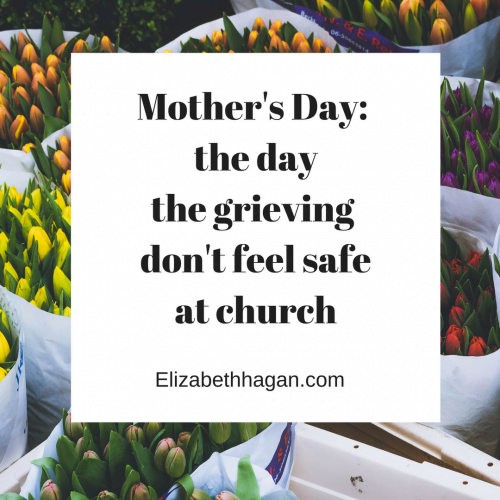
And even now, though I am a mother with little feet running around my house (after a long infertility journey), I still find Mother's Day so complicated.
As much as there is joy in my life, there is also loss, frustration and delayed expectations.
I don't believe I'm alone in these feelings, so as a pastor, I want to be sensitive to the complicated feelings so many of my beloveds will bring to worship on Sundays.
For it's my belief that we can help the grieving feel safer at church by the attention we give to our words and presence on Sunday (or any day really!)
Here's a prayer I wrote in the spirit of truth-telling, sensitivity and kindness. Adapt, use and share as it's helpful to you.
One: Mothers come in many different forms, and today we remember them all.
Many: Thank God for all mothers.
One: For those women who have left earth too soon and in whom we miss dearly.
Many: Thank God for these mothers!
One: For every woman who is raising children now making sacrifices for her children’s becoming.
Many: Thank God for these mothers.
One: For those women who have taken in others’ children through adoption and foster care, showing us that the love of God far extends beyond biological ties.
Many: Thank God for these mothers.
One: For those women with grieving hearts for children that could have been with futures so different from they planned.
Many: Thank God for these mothers.
One: For the special neighbors, teachers, and friends who’ve nurtured us, supported us and helped us to become the people we are today.
Many: Thank God for these mothers.
One: For mothers in which our relationships are complicated, difficult or strained, but who have forced us to choose healthier paths for our lives.
Many: Thank God for these mothers.
One: Mothering God, help us all to reflect more of your compassion, kindness and strength to those around us today. As Meister Eckhart has said, “We are all meant to be mothers of God. God is always needing to be born” let this be true of us! We need more of you, here, God!
Many: Thank God for mothers. AMEN
If I can be a resource to you, as a grieving mother, particularly, don't hesitate to contact me.
 Do you have the courage to show up to hard conversations?
Do you have the courage to show up to hard conversations?
It's no secret that courage is in high demand in these times we're living in.
In our polarized everything culture right now, it's so easy to un-follow our social media "friends" who don't believe as we do. It's easy to worship, work and play only with those in our thought camp. It's easy to turn off the news or ignore today's headlines so to forget the reality.
But, last Thursday night, I witnessed two brave public leaders with courage to face each other. They took the harder way showing up a very public arena. They sat on a stage before 2,500 persons in the pews of The Riverside Church in New York City. With what intent? Direct words about race, vulnerability, trauma and politics. And to meet each other face to face for the first time after a twitter conversation in August 2016 that began with these words by DeRay McKesson, a popular young black lives matter activist and curator of the podcast, Pod Save the People.
"Some people live to see other people fail and that's sad. I've noticed that some people #onhere are just so negative. Find some joy folks."
New York Times best-selling author, University of Houston researcher and middle-aged white woman, Brene Brown tweeted back this: "That’s painfully true. I guess joy just takes more vulnerability than cruelty."
The conversation sparked so much interest and attention that The Riverside Church-- a place known for birthing words that matter-- facilitated the meet-up. 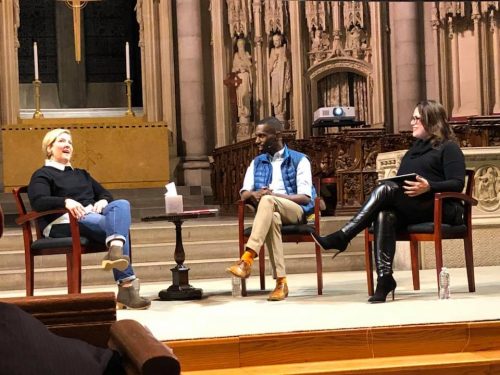
I found myself on the third row for the 90 minute event that became a 2 hour one (that could have kept going). Brene pushed back the latest findings in sociological research. DeRay pushed back on white privilege.
I'm still thinking about lots of things they said (as any good conversation invites you to do) but for today I'm wondering . . . to forge a new path of engaging folks we wouldn't normally talk to, what must we have?
First, willingness to come to the table
There's a sign outside my gym that says, "Showing up is half the battle" and I couldn't believe it more. Isn't getting to the gym so hard sometimes? Things that bring discomfort aren't usually our favorite activities.
Yet, in spite of the expected discomfort, Brene and Deray opened themselves up to this hard work. Let's remember, they didn't have engage in a twitter conversation. They didn't have to show up at the event. But they did. And they kept talking on the stage long after the public conversation ended. It wasn't a staged photo-op for either of them but something very real.
Good work begins here.
Also, ears to hear hard truths
One of my favorite moments of the night was when DeRay spoke of how combatting privilege means being aware of how much space white folks take up in conversations (like Brene was taking up in this one unaware). White people, DeRay said are used to being heard. It's a new starting place to enter a room as a white person aware of those who aren't.
DeRay went on to challenge church folks with this zinger: "Whiteness can be so strong in many congregations that it overcomes belief in God. Whiteness wins over God."
DeRay was brave to tell it like he saw it. Brene was brave to stay in the chair.
And Silence
Another gift of this event was how Brene modeled the gift silent pauses. A dear friend of mine and I joke all the time about our love of "the phone pause."
It's a practice to not rush to the next thing. It's space in conversations to think intentionally. It's the intention of valuing words for the healing or hurt they can cause.
Throughout the event, it was as if you could see the words falling between the two conversation partners as they talked and paused. The words found home deeper into them. The words opened up doors to new beginnings. The words brought life.
I want more life-giving exchanges of words in my life. Don't you? The question I can't get off my mind is this week is: how am I going to start a courageous conversation?
P.S. Do you know ONE friend who might enjoy posts like this in her inbox? Share it, by clicking here.
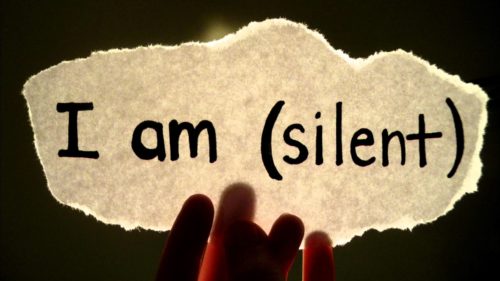 My dear, Christian friends, why are you silent?
My dear, Christian friends, why are you silent?
I can't seem to get the question off my mind.
________
I, like so many of you, found my heart and mind in a tail spin on Wednesday when by a tweet our President declared a new military policy. A policy that called our transgender brothers and sisters "a burden." A policy that kicked them out of military service because of the "distraction."
I use the exact language of the tweet because words matter.
No one likes to be called a burden or a distraction.
We are all children of God. ALL OF US.
Though it is my personal opinion that crazy things happen in our current political administration every day, this particular twitter decree hit me hard. Very hard. Because it was another decision made by one person based in discrimination and hate.
It was a decision that goes against everything my faith stands for: unconditional love, the worth of every living thing and human dignity.
It was a decision that called out one group of people as "less than" rather than celebrating their citizenship and military service.
What do we do next? I admit it's so easy to direct our anger toward #45 isn't it? Say how we feel about him with like-minded individuals? It's easy to launch mean words into the webosphere and block people online (or in real life) who disagree with us.
But here's where I am: I will not be distracted by the anger toward him. He is what he is. I expect little change in his behavior throughout his time in office.
Yet, what I can be is curious about the movement behind this administration. I can be curious about people of faith who voted him in. I can be curious about those who think a sweeping ban of discrimination is ok.
In the latest Politico/Morning Consult poll, at least 1/3 of evangelical Christians said they "strongly approve" of how our President is leading the country.
This fact troubles me the most.
I follow lots of pastors and ministry types of all flavors online, folks that share my political convictions and those that don't. But these are all people I know who believe in the Lordship of Jesus and Jesus' call to love God and love neighbor as one's self. They love people. Or they wouldn't have gotten into the service business, I believe.
So this is what I am curious about: when a group of our neighbors faces discrimination- this week it's those who are transgender (this is one top of immigrants, Muslims, refugees, etc which have already been targets) and next week who knows who comes next-- why do they say nothing?
Pastors: why do you tweet only about your church visitor services programs?
Pastors: why do you post about how you're having a good day because you dried your hair?
Pastors: why do you tweet only about your vacations or what theology books you are reading?
Are you living in a bubble?
My heart aches when you say NOTHING about the sorrow that is felt in your brothers and sisters' households right. Some of our neighbors NEED us right now. They really need us. They need our voices. They need us to say what is going on in our country is NOT ok.
Because IT'S NOT OK.
I'm all for fun. I'm all for light-hearted moments both online and in person. We all need a break from the crazy. Eat ice cream. Go on vacation. Plan for fall programing in worship. And post about our fun on social media. BUT, when we never SAY anything about how what is going on is NOT OK, then those around us only have one choice. They believe we think it is ok.
Of course, the issue of supporting our transgender brothers and sisters is complex, especially in the context of religious life. This might be your current struggle. You don't know anyone who is transgender. It's hard to be a neighbor to someone you don't know.
My wise and brave seminary classmate, Theresa Thames who is now the associate dean of religious life at Princeton University said it so well yesterday on Facebook: "How can we be outraged with 45 when our denominations are debating whether our LGBTQIA siblings are of sacred worth - worthy of holy matrimony and capable of serving our congregations as clergy. WHAT A SHAME!"
Her post was a reality check for me because the truth is when people of all sexual and gendered identities aren't welcome fully in our churches because we're afraid of the "different" why in the world would we (as in the collective Christian "we") be advocates for them in the larger society?
Clearly, there's so much work to do in our business of being the welcoming congregations that we say we want to be!
But for now, my friends, speak up. If what is happening in our country is bothering, don't be afraid. Say so. Now is not the time to be silent. In the name of Jesus who always championed people before the rules of the empire, go forth and speak up!
 Do you think your church is kind on Father's Day?
Do you think your church is kind on Father's Day?
Most of us would say, yes, of course!
Yet, for men who long to be fathers and are not, for any who have a difficult relationship with their biological father, or those who've lost their fathers too soon, Sundays like Father's Day can feel brutal.
ESPECIALLY when:
When we preach solely to the fathers in the sanctuary . . .
When we ask all the fathers to stand up and receive a gift . . .
When talk carelessly about joyous Father's Day plans after church . . .
Real life is so much messier than this, isn’t it? Death, loss, divorce, miscarriage, failed IVF treatments or adoptions are all a part of what it means to be love a father or be a father.
And the words really do matter. Words we say from the pulpit and church parking lots matter. Words form theology, even if we do not intend them too. (Which is probably how Father's Day jumped from a Hallmark holiday to a religious one)
As a pastor who struggled with infertility myself and listened to others who are struggling with other forms of loss, the words I hear over and over about Father's Day is this: “Please talk about me. Don’t leave my story out on Sunday. If you do, we’ll come to church.”
Churches NEED to acknowledge this Sunday the grief that the day holds for many. And celebrate the vast array of expressions of what fatherhood looks like in our society (not just biological children).
So to help with the words that might be said in your church on Sunday, below is a prayer I have used on many occasions. Feel free to borrow or adapt in a way that fits your congregation’s needs this Sunday.
______________________
Fathers meet us in some very different ways, and today we celebrate them all!
Thank God for the gift of fatherhood!
For those men who have left this earth and who we dearly miss.
Thank God for the dads whose legacy remain strong.
For those men for whom we had/ have difficult relationships as fathers.
Thank God for being our Dad when we needed You the most.
For those men raising his children now making sacrifices—rising early to make lunches, picking up from soccer practice and tugging kiddos in bed at night.
Thank God for the dads whose pace is so hectic today.
For those men who have taken in others’ children through adoption and foster care, showing us that the love of God far extends beyond biological ties.
Thank God for the dads with vision to include.
For those men who have lost a child to death or want to have a child and know they can’t without much trouble carrying on with the pain of lost dreams, often not being able to talk about it at all.
Thank God for the dads who carry heavy burdens.
For all the men in our community; who nurture us, support us and guide us in our becoming who show by their example fruits of love, joy, peace, patience, kindness, goodness, and faithfulness.
Thank God for the dads who love unconditionally.
We thank you, Lord, for the men who have influenced our lives in so many ways. And lift our voices in your name, O Heavenly Father in whom we adore.
AMEN
A sermon preached at North Chevy Chase Christian Church in conversation with James 1:17-27
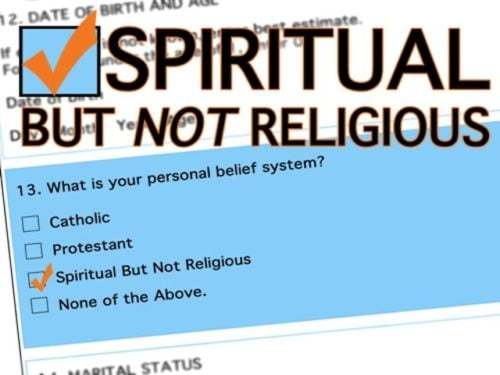 "I'm Spiritual but not Religious" is among the most commonly cited reason why people don’t come to church. Over the years, I've heard:
"I'm Spiritual but not Religious" is among the most commonly cited reason why people don’t come to church. Over the years, I've heard:
“Pastor, I don’t think I need to come to church. I’d rather commute with God by watching the birds on Sunday. This is my spirituality.”
“Pastor, I don’t think I’m coming to come to church anymore. It’s nothing against you or the church people. You all are nice and all. I just don’t need a church for my faith.”
“Pastor, I just don’t know how you can stand working for the church. Have you read history books? Have you read the news lately? The church hurts people. I just don’t get how you could be in the ‘religion’ business.”
But, today, I’m musing about this statement, “I’m spiritual but not religious” in hopes of opening up a larger conversation because I've grown weary of the debate.
I want to start by saying that I believe "spiritual but not religious folks," are good people too. They aren't all anti-Jesus. Their lives aren’t completely void of faith practice. In fact, their lives are often full of good and God fearing things. Many seriously pray, read, meditate, etc. with great furor and discipline our scriptures.
So I don’t necessarily think the excuse of “I’m Spiritual but not Religious” is about laziness—but in many cases their devotion to God puts those of us who are “religious” to shame.
But, even with this true—we in the church often feel like our "spiritual but not religious" friends are like the distant step child that we’d just wish would get with the program, stop being so independent and critical of our structures and join our membership rolls.
We often feel tempted to criticize their faith, especially as their attitude of “My faith can survive without your unnecessary institution” seems like a big slap in the face, to what we’ve worked so hard to hold together all of these years.
We feel tempted to talk about their egos without even considering our own.
And even worse, our culture seems to be in their side with the assumption that spirituality is good; religion is bad.
Or, spirituality equals pure faith and God’s presence. Religion equals corruption, human made flawed structures. We find religion in churches. We find God in spirituality.
Yet the book of James has a lot to offer us here.
And while it’s a book that Martin Luther was known to say is the “epistle of straw” saying that its practical approach to faith is not theological enough—I believe that James is an amazing ancient text wrestling what might not be truly modern problem after all.
James wrote to a community of believers concerned about the essence of faith.
In James' time were many who said: “We’d better get our theology in order. We need to write more doctrine.”
And there were others who said, “Theology is well and good, but what does it mean? What does it look like?”
And to these questions James re-directs the conversation back to God. If I were to sum up the entire book for you it would be this: "It's not that I want to throw out all the great work that Apostle Paul has done in other letters helping us to define the essence of faith. But, I do want you to know how to LIVE OUT YOUR FAITH."
For you can talk a good game for a long as you want, have all the right answers with what you think Jesus meant about this and that, but if your life doesn’t SHOW what you believe then it’s all rubbish.
Pure rubbish.
He writes in chapter 1 verses 26-27: “If any think they are religious, and do not bridle their tongues but deceive their hearts, their religion is worthless. Religion that is pure and undefiled before God, the Father, is this: to care for orphans and widows in their distress, and to keep oneself unstained by the world.”
James is saying that religion’s sake is worthless. It’s a simple but profound truth.
For, if we keep up tradition, for tradition’s sake, it’s worthless.
If we conduct church business in a particular way because it how they did it back in 1995, it’s worthless.
If we maintain our buildings for the sake of maintaining our buildings, then it’s worthless.
If we do a program in the church simply because it went over well last year, it could be worthless too.
For James wants us to consider WHY we do what we DO. For going through the motions is not faith. It’s religion.
In my work with churches during interim times, I’m often pushing church leaders to wrestle with questions like this (and sometimes making people mad in the process):
“Why do we always to have all of these standing committees? Why do we keep these bylaws around though they were written for a church 3x our size?”
“Why do we keep on programs that no one attends?”
“Why do we only welcome people who look like us? Why do we not push outside our comfort zones?”
I ask questions to push congregations to consider how well-meaning structures and activities have become “going through the motion activities” instead of active faith . . . the kind of faith where we are living out the gospel: good news for all who hurting the most.
Let me stop here and say that I’m not saying structures are bad. Rather, mindless choices we make in the name of religious tradition never up for reconsideration are. For sometimes traditions and religious teaching and practice can be indeed just this—practice from human hands, flawed and in need of a fresh wind of the Spirit upon it over time.
Because don’t we believe that Spirit is always at work in our world? Don't we believe that God can always do a new thing?
And if this is true, then what God wanted from us and what we spent so much time building in 1980 might not be what God wants from us in 2016, right?
When it all boils down to it—I believe James begs the church of his day and the church of our day to ask ourselves—are you spinning your wheels on building up what matters or are you just spinning your wheels?
Is our religion that of caring for orphans and widows i.e. those in need of compassionate justice in this world, the most vulnerable?
Or is our religion that of building bigger buildings and structures that leave a mark of “we were once here?”
For, if our life together in community falls more in the second camp then, James tells us to re-think our religion.
Anytime I do a funeral service, I find myself repeating a phrase of exhortation to the mourners—a phrase, I hope at least some of them might remember later because it asks them to channel the grief and loss in life well lived in the here and now. I guess I should get some new material but I can’t seem to find a better way to say it.
“When you and I die, only one thing matters: not how much money we have, not how many flowers decorate the alter, not how many people attend, not how many groups or societies we belonged to—only one thing—is it well with our souls? Are our lives in harmony with God? What will profit a man or woman if he or she gains the whole world and loses their own soul?”
To me this is the important stuff of life: is it well with our souls?
So, this brings me to the place where I really want to say to those people who tell them they are too spiritual for church—I understand. I hear your frustrations.
I realize the church can be a messed up place where we don’t talk enough about how things are with our souls. Institutions are like this. Sometimes we make good decisions that bring us together and other times we miss the mark painfully by spending TOO much time organizing ourselves.
But, I also believe the church is where God wants to teach us. Is the church perfect? No. Has it made way more mistakes in its formation, declarations, and judgments than it has for the good of the world? Probably.
Yet, I won’t leave the church, though; it might be a lot easier in the short turn with a lot less meetings (I mean A LOT less meetings!)
Why? My faith is communal. It’s communal with the saints and sinners who have gone before me. I believe the Christian journey,  like that of the Jewish journey or the Muslim journey, is one at requires a lot more “we” than “I.” I need the church’s religion for my spirituality to have a home.
like that of the Jewish journey or the Muslim journey, is one at requires a lot more “we” than “I.” I need the church’s religion for my spirituality to have a home.
So as you read this my friends, may we not just be those who listen to the word, but are those who DO what it says. This means putting away the excuse or the debate of spiritual vs. religious and getting to work.
Getting to work to bless the homeless.
Getting to work to bless the lonely.
Getting to work to bless the dying.
Getting to work to bless the children.
Getting to work to bless the stranger.
Let us get to work! Let us put away the excuses. And let us live out our faith as the Spirit leads us.
Knowing that no mater if our church building are ever full again-- the calling still remains. Are we listening to the Spirit? Is it well with our souls? Are we blessing who need a blessing the most?
This is our faith. Let's get to work.
Such is the start of several conversations I've had lately with folks who wonder why I'm not serving one particular church, full-time.
"But you're good at it. Why would you not?"
"The church needs you. Why are you keeping your gifts from it by not applying for ___ job?"
"Did you really go to seminary just to supply preach?"
I know that folks don't mean to be rude or insulting with these questions. What they're saying in a round about way, "You're good at this. Why don't you do more of it?"
For it's often the struggling preachers, or the new to ministry preachers or even the older retired ministers who engage in intentional short-term ministry. (And I don't think I fall into any of these categories).
So I get it. From the outside looking in, it might appear like I'm wasting my education, ordination or even time. For it's true: I don't know many 30 something female ministers who have chosen interim ministry as a way of life or even really enjoy supply preaching.
But I do! And here's the thing, I'm not wasting time. I'm exactly in the place of life I need to be.
I'm creating what doesn't exist.
It's great ministry to have one foot partly in the church and another foot somewhere else.
For me that somewhere else includes as much time as I can muster together thinking, writing and writing some more. It's  the place where my book Birthed came from-- squirreling away hours of the day to loose myself in words with hopes that one day they would be of encouragement to someone else. And I would like to write more books.
the place where my book Birthed came from-- squirreling away hours of the day to loose myself in words with hopes that one day they would be of encouragement to someone else. And I would like to write more books.
That somewhere else includes dreaming, planning and working on the administrative details of a foundation I began last year. I've been quiet about it for a while waiting on my 501(c)3 status to come through before I mentioned it to you. But three weeks ago I finally got my paperwork!
 Our Courageous Kids was born!
Our Courageous Kids was born!
Our Courageous Kids is something you'll hear a lot more about in the future. But for now, this what I most want you to know: orphan care has become a great passion of our family. And out of this passion, my hope is that Our Courageous Kids will become a collective voice of empowerment for children that you'll consider partnering with!
It's mission is to come alongside orphanages around the world to provide grants for life and enrichment opportunities as well as scholarships for secondary education and college tuition. I want Our Courageous Kids to say to brave, brave children, you are not alone: you belong to us all and we want you to have the best future possible!
And that somewhere else includes being present with my family. Kevin, my husband, has a very 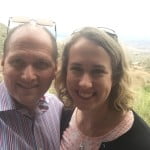 fast paced schedule over at the American Diabetes Association as their CEO. I want to be as supportive to him as I can and available to travel to uplift him and those who are living with diabetes, a horrific disease. I want to have time with the children who are important in our lives. And I want to keep the bonds strong with friends who have become our family in places all over the world. I want all of these things because I know these special people make me more human. They know and love me unconditionally. And I love every minute I get to spend with them.
fast paced schedule over at the American Diabetes Association as their CEO. I want to be as supportive to him as I can and available to travel to uplift him and those who are living with diabetes, a horrific disease. I want to have time with the children who are important in our lives. And I want to keep the bonds strong with friends who have become our family in places all over the world. I want all of these things because I know these special people make me more human. They know and love me unconditionally. And I love every minute I get to spend with them.
While there will always be large membership congregations that require full-time staff, such I think, will become more and more rare.
When I think about where the church will be in the next generation and then the next, I think that more of us will become part-time, embodied in the world ministers than full-time staff members with health and pension benefits.
Sure, financially it can be awkward at times to piece together different kinds of work and pay the bills, but as we as ministers become less dependent on the institutions to support us, we re-gain our prophetic voices.
We can say and do things that the Church needs to hear without fearing we'll not eat if we do. And we might just find ourselves becoming more human in the process. I know this has been my path. And I'm loving it.
What do you need to create that doesn't exist?
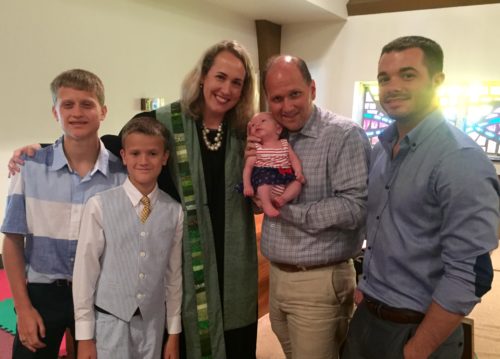 These are busy days around our household for as many of you know in addition to having a new baby around the house and putting the final touches on launching my book, Birthed, I've been serving a short-term pastorate at North Chevy Chase Christian Church in Chevy Chase, MD.
These are busy days around our household for as many of you know in addition to having a new baby around the house and putting the final touches on launching my book, Birthed, I've been serving a short-term pastorate at North Chevy Chase Christian Church in Chevy Chase, MD.
I began there in July and will serve as senior pastor on a part-time basis till October when this congregation's minister returns from her Sabbatical.
It's the first Disciples of Christ congregation I've served since becoming an officially endorsed minister within the Disciples of Christ earlier this year (while keeping my American Baptist credentials from my ordination as well).
If you aren't familiar with this denomination, read more about them here. It's a great fit for my progressive leaning, yet still Jesus loving self. And I'm so thankful for the Capital Area Disciples for welcoming me so warmly since I moved back to DC last year.
It has been fun getting to know North Chevy Chase folks and most of all to be designing and leading worship with them each Sunday.
At heart, I'm really a series preacher. I love taking a topic or theme and staying with it for 4-6 Sundays. It's a great way to LEAD through preaching, helping the congregation get their head around a big idea (and I love big ideas!) But when you're a guest minister (which is what I do a lot of these days) you don't have the opportunity to always carry a series out. So, I've cherished this special experience.
Over the past couple of weeks, we've gone off the lectionary texts and focused our attention in worship on the theme of "Excuses, Excuses." What are the excuses we offer God which keep us from living abundantly? 
Someone came up to me after church yesterday and said this series really surprised her. "I thought you'd just be guilting us as to why we aren't this or that, but instead what you've given an opportunity to look inward and find out what keeps us from close relationship with God. I've needed this time, pastor!"
Right on! (It's so fun when people get what I'm trying to do!)
First we tackled the excuse of "I'm Afraid" taking our cues from the courage of Esther's story in the Old Testament.
Next we examined the excuse of "I'm a Defect" looking at the encounter Jesus had with the Syrophoenician woman-- championing her boldness to not let the challenges of her life define her.
Then, this past Sunday we stuck close to the excuse of "I've Made the Unforgivable Mistake" by reading Psalm 51 and thinking about the tale of David and Bathsheba from the book of 2 Samuel.
And I have to say that this Sunday was one of my favorite experiences of worship in a long time! I realized once again that so many of us (if not all of us) hold things inside, believing the worst about ourselves, and rejecting God's sweet forgiveness.
It was so great to say: "There's nothing you (and I) can do to separate ourselves from God's love" over and over again. We all need to hear it.
In response to the sermon, I invited the congregation to write down on the post-it note in their bulletin something in their life that they felt like was "the unforgivable sin." Then, as we all sang together, one by one everyone came forward and placed the post-it note in a paper shredder as a sign of God's forgiveness.
I stayed at the pulpit watching this all play out until the line reached the end.
And I have to say, that I fought back tears as I heard the shredding sound over and over again.
It was some of the most beautiful spiritual music I'd heard in a long time. For with each post-it note going into, it was a sign of God's unconditional love and forgiveness for a person, and then another, and really for us all. What amazing grace! (And it's something you can try at home... go find your paper shredder too!).
A man came up to me after worship and said, "I'm not one to be writing sins on pieces of paper and bringing them to the front of the church, pastor, but today, reminded me of God's love again."
For this response and the others I will never know about-- I say thank you for the gift of preaching, of leading and of being a part of a particular community. It's the best stuff interim ministry is made of!
And in case you're curious . . . next week's excuse is "I'm Spiritual But Not Religious." Stay tuned . . .
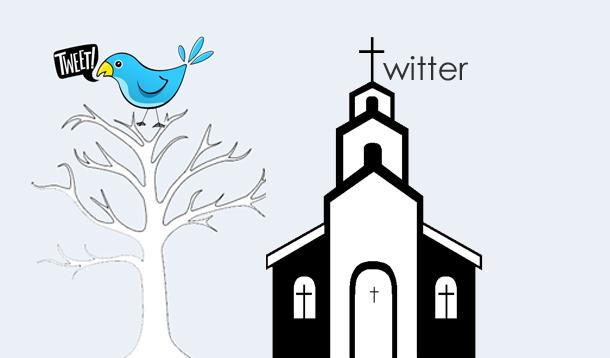 "You should really try Twitter, Elizabeth. It's a good networking tool for the church."
"You should really try Twitter, Elizabeth. It's a good networking tool for the church."
Such were the words from a communications professional friend. In 2008, they fell on my deaf ears.
My distant impression of twitter was a bunch of people saying: "I had a peanut butter sandwich for lunch."
Who really cared? I just didn't see the usefulness in that.
And, furthermore, why did I want to keep up with one more thing in my already over-media-stimulated life ?
I didn't have time.
But, never wanting to be a person behind on something new, I finally gave in to my friend's suggestions, and after a short tutorial from him, I was up and tweeting for the first time in the spring of 2009.
And since then, my love of twitter for ministry has grown and grown. I LOVE Twitter.
This is why-
Through Twitter, I've become friends with new colleagues that I still haven't met face-to-face but now count as great encouragers in ministry.
I've recruited new church members who found me on this site (yes, it really happened) and who later began attending weekly worship regularly.
And a bridge has emerged through Twitter to share my sermons with folks who might never attend a local congregation. Preacher on the Plaza went to Twitter-ville.
Most recently, I've been schooled in important social movements like #Ferguson #BlackLivesMatter #MoralMonday from those on the ground doing really important work!
Different from Facebook which you might be more familiar, Twitter allows you to share conversations without sharing any more information that you are comfortable with.
In choosing to "follow" particular individuals or groups, you gain access to their updates, but they don't necessarily see yours unless they "follow" you as well. (You can even make your profile private if you want to).
The key to Twitter is that you only have 140 characters per post. If you go over this limit, your thoughts are prohibited from being shared. Over time I learned:
If you want more followers, it is good to follow others.
If you want others to keep following you, it is good to tweet more often than once a month.
It is also wise to follow only people in whom you have an interest; for if you don't, your home page will easily fill up with unhelpful spam. And who likes spam?
As I've tweeted now for 6 years and taught others to do the same, I've often thought about the parallels to the church. The "rules" of twitter might have a lot to offer us in the church.
Not only should we tweet, but we should take our cues from our culture's love of tweeting. 
First, say what we need to say and stop.
The days of long typed newsletters addressed with a stamp on a letter in the mail are over. If we want to make connections to potential church members, we have to speak concisely and speak online. We must grab their attention and let them come to you. More words does not equal better.
Second, if we want to reach more people with our churches, then we must "follow" people outside our normal social circles.
It's so easy to connect with those in whom we have natural affinity: moms at our children's schools, other retirees on the golf course, or our neighbors next doors. But if we don't get out of our comfort zones, then we could miss out on amazing possibilities of relationships with people who would benefit from knowing us and us them!
Third, it's a necessity to stay connected to those on our membership roles.
Relationships, like Twitter followers, take time and effort to keep going.
Like Twitter, just because someone joined the church several years ago, doesn't mean that finish line has been reached; it has only just begun!
It is easy for folks to feel "de-followed" by our church when our fellow church members miss important life events like births, deaths, or deaths, without some sort of contact. Communities must communicate together.
After all, the church, like any good means of technology is never something to be mastered all at once. Rather church is something we grow into as it's learned and practiced together.
So, might you consider giving Twitter a try? Find me @elizabethhagan and let's talk!
Or if not, at least consider take your cues, oh church loving friends, from this amazing social media tool.
A sermon preached at the Martin Luther King, Jr. Christian Church, Reston, VA
on the occasion of Rev. Dr. Jean Robinson-Casey's anniversary as pastor 1 Samuel 15:34-16:13
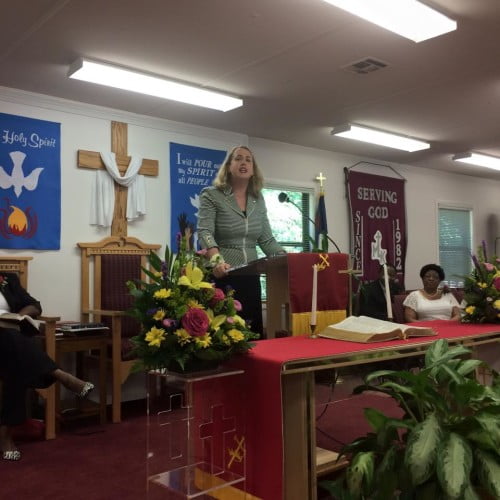 A kindergarten teacher gave her class a “show and tell” assignment. She said: bring something to school tomorrow that represents your religion.
A kindergarten teacher gave her class a “show and tell” assignment. She said: bring something to school tomorrow that represents your religion.
The first child got in front of the class and said, “My name is Benjamin and I am Jewish and this is the Star of David.”
The second child got in front of her class and said, “My name is Mary, I am Catholic and this is the Crucifix.”
The third child got up in front of his class and said, “My name is Tommy and I am Baptist and this is a casserole.”
And it’s true, when it comes to death, we know how to make a good casserole (and not just the Baptists).
We also know how to visit funeral homes and even write sympathy cards.
But, when days turn into weeks and weeks turn into months after someone’s beloved has passed what do we do?
Usually nothing.
But I believe our Jewish brothers and sisters have it going on when it comes to grief. Have you ever grieved alongside a Jewish family?
One of my favorite practices of a Jewish season of grief is called Shiva.
Shiva is the 7-day time period after the loved one dies when the family and friends gather on a nightly basis at home usually with the Rabbi to say prayers and remember the life of their beloved. Night after night after night. For seven whole days (and sometimes beyond).
During the Shiva period, mourners also do not participate in parties, concerts, TV, movies, or similar events that are celebratory in nature. Those who visit the house in mourning pay their respects by sitting on low stools or even on the floor. Mirrors are covered throughout the house. And often the mourner wears a torn black ribbon on their clothes as a sign that the loss of the loved one has torn a piece of their hearts. Candles are burned.
Then at exactly a year after the passing of the loved one another special ceremony is held to mark the end of the life again. In my opinion, these are some beautiful rituals!
But no matter how long we grieve or don’t grieve for the losses in our life, if we’re Christian, Jewish or Muslim, there’s always an expectation of an expiration date for grief no matter the culture. Isn’t there?
But often our grief has a life cycle of its own.
I don’t want to be the pastor this morning that tells you not to grieve, not to pour out your heart to God when the situation asks for it.
I don’t want to be the pastor who tells you to have any shame when life hits you with an unbearable loss.
I don’t want to be the pastor who says don’t cry if you need to, even in public (which I have to tell you my husband, Kevin hates when I cry in public because he always says people are then looking at him, thinking that it’s his fault when it’s not).
No, this morning, I don’t want to be anti-grief at all.
But I am going to ask you this morning this one question, “How long will you grieve?”
How long?
This morning, in our Old Testament lesson, we encounter two powerful leaders transitioning toward how the promptings of God’s leadings. And one was asked the question, “How long will you grieve?”
One man was priest in chief in all the land. The other man was the king. The king is told by the priest that he would soon no longer be king. The king doesn’t like this news (of course). And the priest doesn’t like giving it. But this does not change the facts.
Grief enters the picture.
But the Lord says the priest struggling with the change, “How long will you grieve?”
How long?
Let’s talk more about WHO these two men are.
First, there’s Samuel, the priest. He’s an honorable man before God whose calling came even before he was born!
His mother Hannah prayed so hard for him that when onlookers saw her in the temple crying out to God they assumed she was drunk. But thanks to Hannah’s prayers and the Lord’s hand on his life, Samuel listened rightly from a young age.
Remember his famous call story? Samuel lives in the temple of the Lord alongside the high priest at the time, Eli.
One night Samuel hears the voice of something calling. It comes not once, not twice but three times. And Eli tells him when he heard the third time to say, “Speak, Lord for your servant is listening.”
And from this point on, as Samuel began to play a major role in the spiritual life of the nation of Israel: he was God’s mouthpiece.
As the people cried out to be a nation “like everyone else” and not be ruled by judges but by kings, it was Samuel’s role to anoint the first king of the land.
This brings us to our second character of the day, Saul. Scripture tells us that he’s good looking and a head taller than everyone else. And of course being tall and handsome makes for a great leader, right?
But, Saul was from the tribe of Benjamin, the smallest and least important tribe of the nation—so still unlikely choice when picking kings if it came down to a popularity contest. But back in chapter 9 of the book of I Samuel, we learn, though, that Saul is God’s man. At age 30, he descends the throne. The very first king in all of Israel!
And Saul’s a good king until . . . he stops listening to the One who put him on the throne. He becomes more afraid of what the people say about him rather than God. He can no longer be trusted to do as God asks him to do. According to God, Saul must go. Samuel needs to break the news to him.
Can you imagine what this meeting of “You’re fired!” felt like, especially for Samuel?
For, Samuel had invested so much of himself in Saul.
Samuel was Saul’s go to advisor, teacher and trainer.
Samuel had laid aside his ego so that Saul could do his thing and shine.
And now it seemed like all of this hard work was for nothing! A dream cut short.
If we go back a couple of verses, we learn that when Samuel first hears this news from the Lord, he “was troubled and called out to the Lord all that night.”
If that is not a picture of grief, I don’t know what is! For we see Samuel:
Crying out.
Not sleeping.
Counting the minutes on the clock till morning.
(And we’ve all been there too).
But as time passes, the Lord comes to Samuel again and says: “How long will you grieve?”
How long?
I want to stop right here and check in with what I think some of you might be wondering about your preacher this morning:
“Don’t I know what Sunday this is? Don’t I know what occasion I came for? Did I get confused? Don’t I know that a Pastor’s anniversary service is supposed to be about celebration, not all this depressing talk about grief?”
Yes, I know. And I know that you love your dear Pastor Jean and Clyde. And I love them too. And I’m so glad you set this day aside every year to celebrate their ministry among you.
It’s a word that asks us about all the places in our lives where we are stuck.
It’s a word that asks us where we’ve been paralyzed by the vision that we have for our lives that's not working out.
It’s a word that moves us to action: to lay down the losses that we can’t just seem to get over SO that God’s fresh new wind can blow it’s way through us again.
I don’t know about you, but if I were to make a list of the grief like this, the list would be long.
All of this is leads to grief my friend. Real grief.
And as a church family we’ve got our grief lists too.
And to this, the Lord says, “How long will you grief?”
How long?
I guess, church, we all have a choice.
The Lord says to us, fine. Have your grief if you want it. Have your sleepless nights if you want it. Have your vision of your life if you want it.
But if you are ready for something better, then grieve no more. Let what is dead be dead.
The morning has broken. A new day is here. Open your eyes to see it.
Consider what happened next with our guy, Samuel. As we go back to I Samuel 16 new possibilities come into Samuel’s view.
 From God, Samuel receives specific instructions on how to proceed. He’s told to go to Bethlehem. He’s told find the sons of Jesse. He’s told that when he reaches the village, he’ll know which one of the young men will be the next leader.
From God, Samuel receives specific instructions on how to proceed. He’s told to go to Bethlehem. He’s told find the sons of Jesse. He’s told that when he reaches the village, he’ll know which one of the young men will be the next leader.
Samuel is confused (as we often are) but he’s attentive to the voice of the Spirit. He listens! And the most unexpected leader emerges.
David, who is young, small and most certainly NOT ready for a gig on the national stage is presented last.
Samuel hears this: “The Lord does not look at the things man looks at. Man looks at the outward appearance but the Lord looks at the heart.”
Get your head out of the rear view mirror and look up ahead. See I am doing a new thing, do you not see it?
How long will you grieve, Samuel?
How long?
I once heard a story from one of my colleagues about a young couple that attended his congregation.
This couple, I learned from my pastor friend were so in love when he married them, so compatible, so full of great plans for their future of children, vacations and the young wife even wrote a plan for how they’d celebrate the best holiday traditions while they were still engaged.
But, then 2 months into their fairytale like marriage the husband was driving home from work and was instantly killed one evening by a tracker trailer.
You look up the word “unfair” in the dictionary and there should be a reference to the newspaper story about this day. Car accidents should never happen. And the most certainly should not happen to bright 20 somethings.
My pastor friend went on to tell me more about this widow. How she began a daily ritual a couple of days after the funeral.
Every morning, she’d go to graveside, take her coffee and read aloud from one of her devotional books or other literature she liked.
When anyone asked why she did this, the widow would always answer, “Because it’s how I feel close to him.”
We want to say awww don’t we? It’s a beautiful expression of the timeless bonds of love, isn’t it?
But then when I asked my pastor friend what I thought was a basic question, “How long ago since this husband died?” the pastor said to me, “The wreck was 23 years ago!"
I gasped. The pastor went on: "Though she gets regular invitations to re-imagine her life with new friends, new activities and even new romantic partners, this woman will not stop grieving. She won’t stop going to the grave every morning.”
We’ve also gotten stuck on what we hoped our family would be! We too have gotten stuck on what we wished our career could be! We’ve gotten stuck on what somebody else said our church should be by now!
And in our grief, we’ve forgotten the resurrection power of our Lord. We’ve forgotten to dream a dream and live into something new, the new that our all-knowing Lord has prepared for us all along.
So church, do you want to move into the new?
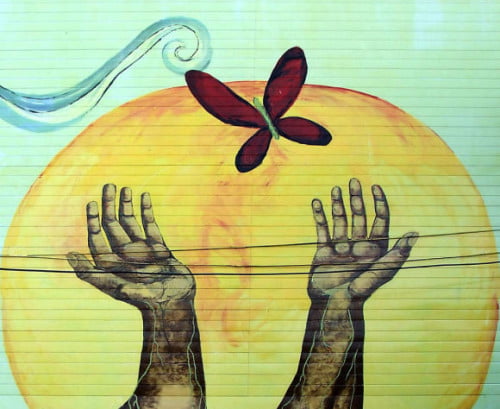 I can’t think of any better way on this anniversary of your pastors, than to commit to yourself this morning to grieve no more on what the Martin Luther King, Jr. Christian Church is not.
I can’t think of any better way on this anniversary of your pastors, than to commit to yourself this morning to grieve no more on what the Martin Luther King, Jr. Christian Church is not.
I can’t think of any better way to live into where Pastor Jean and Clyde are leading you in the future than to lay aside the losses of the past.
I can’t think of any better way to be good stewards of the ministry that God has given you in this place than to mark this day, to mark this day as the day when you grieved no more.
To claim this is a day when you said to Jesus, “I am going to trust you.”
“I am going to follow you.”
“I am going to step out on faith with you . . . even if what I really want to do is run for the covers at in bed at home.”
And most of all: “I am going to grieve for the past no more. I am going to say yes, Lord. Yes, Lord to what you have for me.”
So, church, how long will you grieve?
Let's leave the tombs and follow our resurrected Lord.
AMEN
"Instructions for living a life. Pay attention. Be astonished. Tell about it." -Mary Oliver
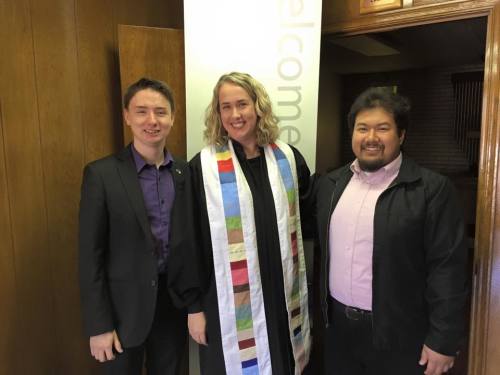 After I left my position as pastor in December of 2012 to follow Kevin to Oklahoma and his work with Feed the Children, I thought I might never hold an official position at a church again.
After I left my position as pastor in December of 2012 to follow Kevin to Oklahoma and his work with Feed the Children, I thought I might never hold an official position at a church again.
Much like I'd given up teaching elementary school after graduation from college, I thought maybe this "pastor thing" was over for Elizabeth Hagan.
During the previous four years I'd served as pastor of Washington Plaza Baptist in Virginia, I'd come to know a few things:
Why would I go back to an every week gig?
Maybe I was called to create a way of pastoring in the world that was altogether new? Especially as I found myself in a state where "my kind" of preaching (i.e. I was a woman) wasn't welcomed. It all seemed like a good decision.
Yet, I knew I'd always preach. I just figured I'd supply preach a lot for colleagues. And from January 2013- August 2014, this is what I did. I even found a lovely little Native American congregation in Watonga, OK that welcomed me almost every month to fill the pulpit.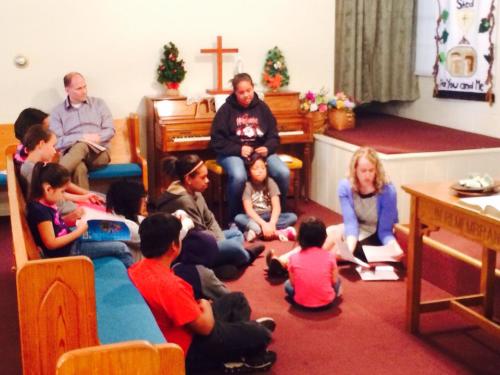
I made peace (mostly) with my non-traditional status. I boasted in the prophetic possibilities of giving just one sermon in a congregation and then leaving. I used my free time to travel, "to feel like a normal person" who ate pancakes on Sunday mornings, and I wrote a lot. I even boldly blogged once that this preacher on the plaza life was who I was made to be!
But, then a weary season came on. Last Palm Sunday and Easter I sat in the pews for the second year in a row. I felt more than restless. My voice that once powerfully proclaimed truth now felt so shy. Being only "Kevin's wife" became a burden to big to bear. I started doubting I had anything to offer anyone.
Thanks be to God I didn't stay in this dark place. A few friends held me up until I had enough courage (or maybe desperation) to give Oklahoma another chance to surprise me.
Enter The Federated Church in Weatherford, OK into the story.
Six months ago, I accepted the position of interim pastor with them. And after a couple of weeks, I found myself in love all over again.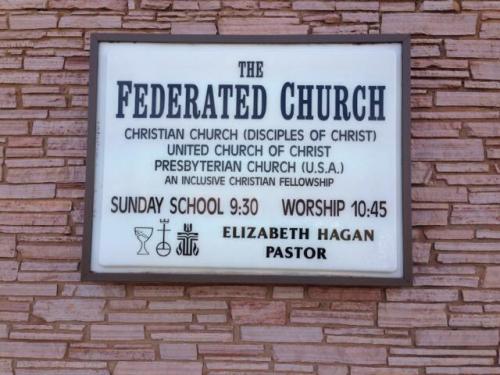
Standing the pulpit every Sunday morning felt like coming home.
Looking at dear ones in the eyes as I served them communion felt joyous.
Positioning myself between the children on the front steps of the church felt like a place I never left.
Even sitting in budget and church board meeting felt like returning to the zone for which I was made.
With astonishment, I learned this: I need the church. And the church needs me.
As much as I want to do church differently-- in a way that doesn't eat up all my time and emotional resources-- I realized that I can't leave altogether. Supply preaching is just not enough. I need to be in a church leading on a regular basis. Not only because it's what I have a degree and ordination status to do, but it is what God called me to do. To not serve the church, for me, is to miss out on the meaning of my life.
And as much as I want to say that the church must change and traditional structures are dead, they aren't. The church needs compassionate and thoughtful leaders that treat its congregation members with respect and dignity. The church needs leaders who can creativity imagine its new becoming even with all the changes in American religious life. I know I am a professional who can do this. I know I can love and serve a group of people well.
So, here I am telling you about it.
First of all so that you can give thanks to God with me for the hospitality and grace of The Federated Church for calling woman such as me into their pulpit and giving me this great gift!
And second so that you can hold me accountable for the seasons to come-- that Pastor Elizabeth is my name.
I need the church and the church needs me.
 When you go from being the associate pastor to the lead pastor in a congregation, there's one huge dynamic that changes. You pay close attention to the numbers on the membership roles.
When you go from being the associate pastor to the lead pastor in a congregation, there's one huge dynamic that changes. You pay close attention to the numbers on the membership roles.
Everybody wants to know is the church growing or isn't it? Everybody wants to know why so and so hasn't been to church in a while? And as the senior pastor you need to respond.
Here's the secret I want to let you in on today: when you leave a local church, it hurts the pastor's feelings.
Even if the reason cited by the leaving congregant has nothing to do with me, I feel responsible every time it happens.
These are some of the reasons I've heard:
1. I am too spiritual for the church. (Yes, people really admit this!)
2. I don’t need a community to live out my faith.
3. I’d rather pray at home and do yoga.
4. I travel so much for work and fun. Considering all the time I’m gone it just doesn’t seem worth it to come during the couple of times a year that I am around.
5. I don’t like ____ person. I can’t come to the same worship space as them. I’ve been hurt. I will not come back. Reconciliation . . . that is out of the question.
6. My life is just too hard right now. I can’t be a part of a community. I need space. Lots of space.
7. This ____ project at church didn’t turn out like I hoped it would. Since I didn’t get my way, I can’t come back. It’s too embarrassing.
And the list could go on.
At this juncture, the direction of this blog post could go several ways.
I could pout. I could put down those who leave. I could strive to make comments about the state of American religion and the dying mainline church.
I could tell you to read a lot of Diana Butler Bass who says things like: “Although churches seem the most natural space to perform spiritual awakening, the disconcerting reality is that many people in Western society see churches more as museums of religion than sacred stages that dramatize the movement of God's spirit" in her book Christianity After Religion.
Or, I could propose some grand idea about how to reform the church so that such “I quit the church” declarations decrease.
But, I won’t do any of these things because I’m just not sure of these ideas are helpful.
The most helpful thing I know to tell the truth.
People are leaving church for no church.
But I don’t think this makes the church any less important in society.
For example, I do weddings and funerals all the time for those who are without a church who want to celebrate major life events in a holy space with a minister. When people find out I'm a minister, I'm asked to enter into spiritually focused conversations all the time. Folks show up at the door my church almost every week asking for assistance with food or desiring prayer and most all of them aren't members of my congregation.
I don't think that folks are searching spiritually any less than in 2015.
They are just finding what they want outside our walls.
So what does that say about what we are doing inside?